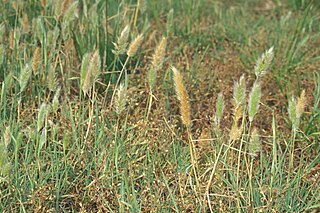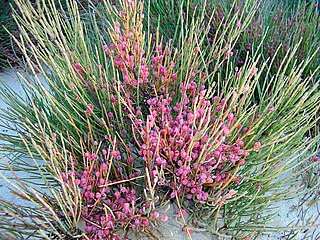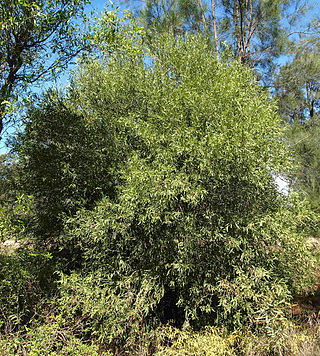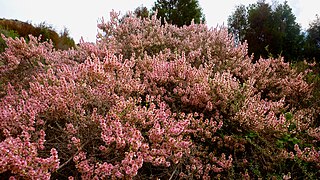
René Louiche Desfontaines was a French botanist.

Micrantheum is a genus of four species of flowering plant in the family Picrodendraceae and is endemic to Australia. Plants in the genus Micrantheum are heath-like, monoecious shrubs with simple leaves usually in groups of three, and flowers arranged singly or in small clusters in leaf axils, male flowers with three, six or nine stamens.

Verticordia brownii, commonly known as pink brownii or pink cauliflower is a flowering plant in the myrtle family, Myrtaceae, and is endemic to the south-west of Western Australia. It has small, neatly arranged, oval leaves and heads of pale pink to magenta or white flowers. It was one of the first verticordias to be collected, although it was not initially known by that name. The collection was made by Robert Brown on the Bass and Flinders circumnavigation of the Australian mainland on HMS Investigator.

Verticordia plumosa, commonly known as plumed featherflower, is a flowering plant in the myrtle family, Myrtaceae and is endemic to the south-west of Western Australia. It was the first species in the genus to be described, although initially given the name Chamelaucium plumosum. It is a shrub with linear leaves and rounded groups of scented pink, mauve or white flowers. Two varieties of this species have been declared as being "threatened".

Polypogon is a nearly cosmopolitan genus of plants in the grass family, commonly known beard grass or rabbitsfoot grass.
Desfontaines is a surname. Notable people with the surname include:

Ephedra altissima is a species of Ephedra that is native to the western Sahara, and also to the Canary Islands.

Ephedra fragilis, commonly named the joint pine, is a species of Ephedra that is native to the western Mediterranean region of southern Europe and Northern Africa, and from Madeira and the Canary Islands in the Atlantic.

Tetrapogon is a genus of grasses.

Echinaria is a genus of Eurasian and North African plants in the grass family. The only known species is Echinaria capitata, native to the Mediterranean Region as well as the Southwest and Central Asia.
Cynosurus elegans is a species of grass in the genus Cynosurus. It is found in southern Europe, north Africa, Middle East and Turkmenistan.

Micrantheum ericoides is a species of flowering plant in the family Picrodendraceae and is endemic to eastern Australia. It is a small, heath-like, monoecious shrub with linear to narrowly elliptic leaves, and small white or pinkish flowers arranged singly or in pairs.
Ancylanthos was a genus of flowering plants in the family Rubiaceae but is no longer recognized. It was originally described by René Louiche Desfontaines in 1818. In 2005, it was sunk into synonymy with Vangueria, based on a phylogenetic study of DNA sequences.

Alectryon oleifolius, commonly known as boonaree, inland rosewood or bullock bush, is a species of small tree of the soapberry family Sapindaceae, native to Australia.

Erechtites glomeratus, common name New Zealand fireweed, or cutleaf burnweed, or fireweed or Cluster-headed fireweed, is a species of plant in the sunflower family. It is native to Australia and New Zealand, and also naturalized on the Pacific Coast of the United States.
Quercus pseudococcifera is a species of flowering plant in the beech family Fagaceae, native to the west and central Mediterranean.

Giles Munby (1813–1876) was an English botanist. His major work concerned plants in North Africa, where he lived for 15 years.

Diplolaena dampieri, commonly known as Dampier's rose, is a species of flowering plant in the family Rutaceae. It is endemic to the west coast of Western Australia. It has slightly leathery, oblong-elliptic shaped leaves, hairy bracts and pale red to orange flowers from July to September.

Codonocarpus cotinifolius a tall shrub or tree in the Gyrostemonaceae family is a found in all mainland states of Australia, including Victoria, and is widespread in arid areas. It is suspected of being toxic to stock.

Soda oppositifolia is a species of halophyte shrub native to the Mediterranean Basin.
















